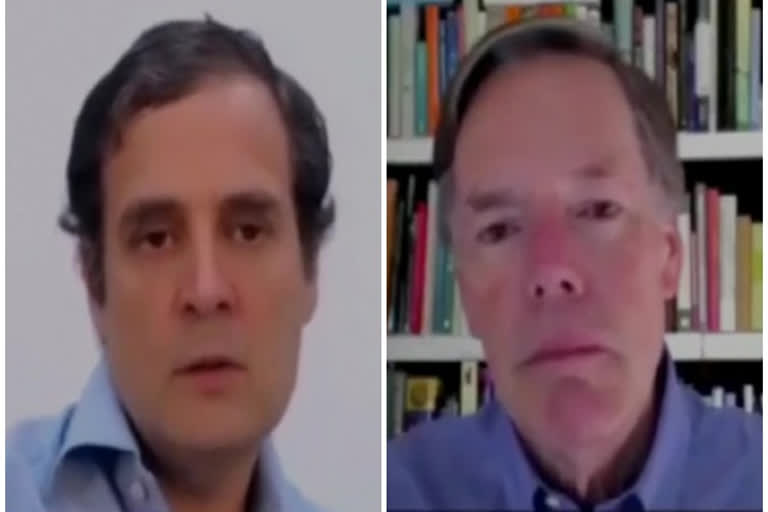New Delhi: Former US diplomat Nicholas Burns called President Donald Trump a 'unilateralist', during a conversation with Congress leader Rahul Gandhi, on Friday, saying that he doesn't believe in international cooperation.
Nicholas Burns, who is currently a Professor of Practice of Diplomacy and International Politics at Harvard's Kennedy School, had an interaction with Rahul Gandhi on how the world has failed to come together to work towards a common goal even during a major crisis of COVID-19 pandemic.
In the brief interaction, Burns said, "This crisis was made for the G20, for Prime Minister Modi, President Xi Jinping, and Donald Trump to be working together. All of us are confronted, vulnerable to this disease. In the beginning, I thought that countries would put down their differences and work for a vaccine together or how to distribute that vaccine equitably and humanely, but it hasn't happened."
He further added, "This is mainly because Donald Trump doesn't believe in international cooperation. He wants America to go alone in the world and President XI Jinping shows to compete with him. I hope when the next crisis comes, we will do better to work together more effectively."
To this, the Congress leader replied that the Indian Government has also taken the unilateral decisions during this pandemic and imposed the biggest and most stringent lockdown in the world. "India saw the biggest lockdown and people were forced to walk hundreds of kilometres to reach home. The scenes were terrible. We have seen a disruptive leadership but I am still hopeful for my country," he said.
When asked about the effect of COVID-19 to shape the balance of power in the world, Burns said, "We need to have a future of global politics. Of course, we are going to compete, but we need to preserve space that we can work together on behalf of individual people around the world. That's the challenge with COVID."
"China certainly has extraordinary power but it lacks sophistication and openness of a democratic country like India or the US. China has a fearful leadership. The Chinese system is not flexible to accommodate aspirations of its people," he asserted.
READ: GST payers seek relief ahead of crucial GST Council meeting
The conversation between Gandhi and Ambassador Burns also involved the issue of racism in the United States and the flashpoint created by George Floyd's killing.
"Our greatest American in the last hundred years is Martin Luther King Junior. He fought peaceful and nonviolent battles. His spiritual Idol was Mahatma Gandhi. King lead us to become a better country. We elected an African-American President Barack Obama and yet you see the race come back now. You see African-American mistreated," Burns said.
He called the killing of George Floyd a 'horrible' incident and said that even when millions of Americans are protesting peacefully, President Trump treats them as terrorists. "One of the advantages that we democracies have, over an authoritarian country like China, is that we can correct ourselves. We will be back, we will strengthen our democracy," said Nicholas Burns.
To this, the Congress leader said that the 'open DNA' and tolerance that India and the US were known for, has disappeared. He added, "This division which occurs is tremendously weakening for the country. But the people who do to this division portray it as the strength of the country. The same people who weak this structure say that they are nationalists."
"This is what President Trump is all about. He wraps himself in a flag and declared that he alone can fix the problem. I must say that President Trump is in many ways an authoritarian personality," Burns replied.
Gandhi also noted that the Indo-US relationship which 'used to be very broad' is now focused mainly on the defence.
The interaction with Nicholas Burns is a part of the video series of Rahul Gandhi's conversation with the global experts of various sectors regarding the impact of COVID-19 pandemic in the world. Before this, Gandhi also spoke to Raghuram Rajan, Abhijit Banerjee, Johann Giesceke, and Rajiv Bajaj.



